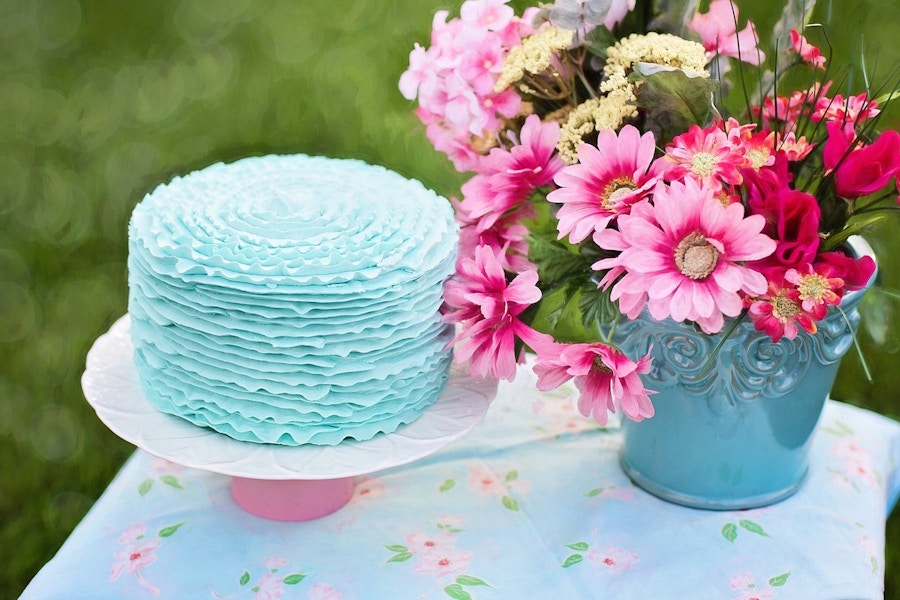Introductory Note:
The small staff at Renovaré has a surprising number of birthdays in February, so that got us thinking about cake.
We also have some staff members who plan to give up sugar during the season of Lent, so that got us thinking about cake.
We also recently listened to a radio drama about the life of St. Francis of Assisi in which cake plays a minor, but significant, role, so that got us thinking about cake.
Also, we spend quite a bit of time just thinking about cake in general.
So, we hope you enjoy this light-hearted piece (not of cake) to welcome in your weekend from our very own admin, Justine Olawsky—who is also a big fan of cake.
(Posted with all apologies to our gluten-free friends.)
Renovaré Team
They say that as Francis of Assisi lay dying he asked one of his brothers to write a letter to “Brother Jacoba.” Jacoba of Settisoli was a wealthy young widow when she met Francis in Rome at the beginning of his ministry. When she asked to join his band, he said that they did not yet have an order of sisters. She replied, “Then take me as one of your brothers.” He dubbed her Brother Jacoba and asked her to stay in Rome and serve the poor. Apparently, she made a particularly delicious almond cake that became a favorite of the young friar.
So, on his deathbed, he asked a brother to write to Jacoba and ask her to bring to him, “some of the almond cakes you used to make for me in Rome.” Before he could finish the letter, there was a pounding at the door. Brother Jacoba stood outside and demanded admittance to her friend’s chamber. Women were forbidden in the friary, but Brother Jacoba would not be dissuaded. She swooped into Francis’s room and deposited at his bedside his favorite almond cakes. How Francis must have smiled!
At church, we have a community meal every fourth Saturday. You know how every congregation has at least one amazing cook whose gifts are called upon for every event both social and toothsome? Meredith is ours. She organizes every community meal. And every community meal ends with cake. Meredith and Jacoba are cut from much the same cloth. I doubt anyone could keep Meredith from bringing dessert to a dying deacon either — or to anyone else for that matter. Cake is her calling card.
Do you like cake? I do. I’m pretty sure God does, too. After all, it is what he sent one of his major prophets in his darkest hour.
1 Kings 19 tells the story of the prophet Elijah’s fleeing the vengeance-filled heathen queen Jezebel. He ended up in the wilderness – that great biblical setting of testing and redemption – plopped himself under a broom tree, and, with just a touch of the dramatic, prayed that he might die. Angels came to comfort him. And, just like sympathetic church ladies would for their suffering co-congregants thousands of years in the future, they brought him cake. Thus, one lesson from this story must be that when you’ve used up your last strength running for your life and hitting dead ends, and even when you have given up hope, cake helps. At birthdays and weddings, at funerals and during illnesses, at the end of one dream or at the kindling of a new one, cake has a role to play.
Sometimes I think I can chart my life in cakes. The lemon cake we dyed green for St. Patrick’s Day … the first year I had to bake my own birthday cake … the multi-tiered creation at our wedding reception … the first time I made a rum cake with those delicious pockets of pecans on top … the day I discovered the ultimate recipe for coconut cake … all the way up to the chocolate rum cake with this amazing glaze that I made for kicks a few weeks ago. OK, so now I’m getting hungry. Nota bene: Never write about cake right before dinnertime.
In the interest of some sort of edification, and not simply a recitation of delectable baked goods, here is a short history of cake:
The original cakes were not the sweet confections we know and love today, of course. Elijah’s cake was probably more like bread sweetened with honey or fruits. In fact, whenever the word translated as “cake” appears in the Bible, it is usually referenced as a cake of figs, dates, or raisins. Poor Israelites! All the fruitcake and none of the Christmas!
The first truly sweet cakes arrived on the scene in the 17th century, along with the wider availability of refined sugar. They still tended to contain fruits and used yeast as the leaven. Our modern notion of cake came only in the 19th century, as white flour and baking powder joined to form the smooth, moist concoctions we currently use to mark great occasions.
How did cakes become almost the universal celebratory or consolatory dessert? The Food Timeline website (foodtimeline.org) offers this explanation: Cakes are served at special occasions (birthdays, weddings, holidays, funerals) because they represent our best culinary offering honoring our most loved people. In “olden times” when refined sugar, spices, nuts, and dried fruit were expensive, it was an honor to be honored with cake. Today cake isn’t super expensive and we have many choices (store bought, box mix, scratch, bakery special order) but the message remains constant. Cake says: you’re important and we love you.
There you have it. Cake says, “You’re important, and we love you.” Which gets me back to Elijah. He felt unimportant, which is surprising, if you think about it. He had just experienced what my Bible calls the “Mount Carmel Victory” before his flight into the wilderness. Remember that thrilling showdown between the prophets of Baal and Elijah? Each side prepared an offering for its god, short of igniting the fire beneath it, and then each called upon its deity to light the fire and consume the offering. When you read the account, it is quite hilarious. The heathen prophets “called on the name of Baal from morning even till noon, saying, ‘O Baal, hear us!’ But there was no voice; no one answered. Then they leaped about the altar which they had made.”
Next came Elijah’s turn. Before he even called upon Yahweh to ignite the offering, he upped the ante by instructing that the wood beneath it be doused three times and surrounded by a trench of water. Elijah offered one simple prayer to the Lord, and God’s heavenly fire fell and consumed not only the offering, but “the wood and the stones and the dust, and it licked up the water that was in the trench.”
What a victory! How short-lived!
A mere six verses later, Elijah was on the run for his life. When, under that juniper tree, he prayed that the Lord would take his life, “for I am no better than my fathers,” he must have felt so hopeless that, even after that grand spectacle on Mount Carmel, the wicked queen still had so much earthly power. With great gentleness, the Lord sent Elijah cake and rest before addressing him in that still, small voice. Elijah still had work to do on earth, but cake helped remind him that he was important and loved.
Cake says, “You’re important, and we love you.” I cannot repeat that enough. These outward signs of inward priorities are really so significant. Which is how Brother Jacoba knew to bring almond cake with her when she said goodbye to a friend. It is why Meredith lavishes her considerable culinary skills on the community meal, and especially why she makes cake for our guests. It is the simplest way to convey a profound message: You are important, and we love you.
May our hearts be formed to love, O Lord, and our lips be shaped to praise. Teach our minds to think your thoughts; our feet to walk your ways. No matter how the road may curve, help us know the path to take. And when you ask our hands to serve, may they e’er be serving cake! Amen.
P.S. If you would like the ultimate coconut cake recipe, just email Justine at [email protected]. She is happy to share.


